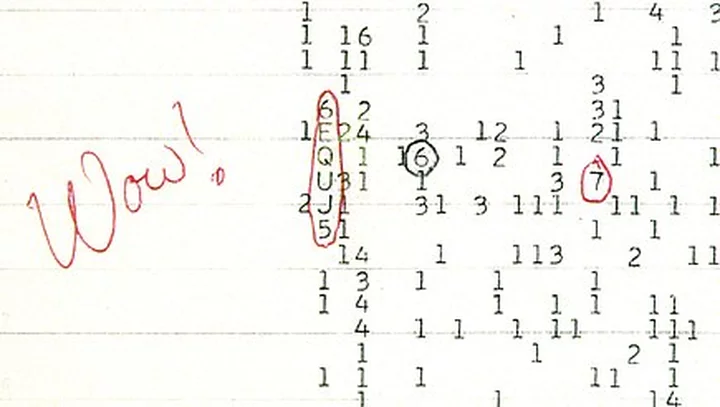A few weeks ago, I wrote about why we shouldn’t take stories about unexplained sightings — UFOs, UAPs and the like — as evidence that extraterrestrial aliens are here. Camera anomalies, drones, fireballs, Venus, weather balloons, etc. etc. offer more prosaic (though more boring) explanations for the many oddball reports, civilian and military, that make the news every year. There remains the big question, with hundreds of billions of planets in our own galaxy, many perhaps with the potential for intelligent life: Where are they? It’s the so-called Fermi Paradox. Fourteen tentative answers:
- Too soon. Yeah, they were here, they checked in on Earth a few hundred million years too early, “Nothing to see here, move along.”
- Too big. he universe — even the Milky Way — is just too big to traverse. You’re stuck with that speed of light problem — the closer you get to the speed of light, the more energy you need to accelerate until it gets to be infinite — and with a galaxy 100,000 light years across, the ETs just don’t have the resources to check out every Podunk planet.
- Too picky. They wait until they detect radio waves from a candidate planet before checking it out, or reply to. And since Earthlings have only been emitting radio waves for 100 years (which are probably garbled beyond about one light year — it was only in 1974 we sent out a deliberate, high-power radio signal), we’re limited to alien civilizations within 50 light years of us. That’s maybe 2,000 stars and their planets — pretty slim pickings when there are some 400 billion stars in the Milky Way.
- Too incurious. They just decided not to explore the cosmos.
- Too little knowledge. Perhaps they don’t even know there is a cosmos — they evolved in an ocean deep inside a frozen planet or its moon, trapped below the surface, but shielded from cosmic rays or a poisonous atmosphere. From their point of view, there is no outside universe.
- Gravity well. They’ve evolved on a “Super-Earth.” That’s the name astronomers have given to (apparently common) planets having much more mass than that of Earth. If your home planet has a mass ten times that of Earth, but is about the same size, you’re going to have a devil of a job leaving it, since the escape velocity is so large. Think NASA’s Artemis rocket is big and powerful? You’d need something with about 2.4 times as much oomph to get off a typical Super Earth.
The “Wow” signal is the strongest candidate for a radio transmission from extraterrestrials detected to date. The narrow band signal was picked up on August 15, 1977 by Ohio State University’s “Big Ear” radio telescope. Seemingly coming from the direction of Sagittarius, the 72-second burst was noticed a few days later by astronomer Jerry Ehman, who wrote “Wow!” next to the printout. (Big Ear Radio Observatory and North American AstroPhysical Observatory, public domain)
- Invisible. We don’t see them because they’re invisible to us. We’re stuck with the confines of our Hollywood-honed imaginations, and the idea of not being able to see, hear or touch them is beyond our capabilities. “We’re looking for analogues of ourselves,” says SETI’s Seth Shostak, “but I don’t know that that’s the majority of intelligence in the universe.”
- Robots. Any aliens speeding through space aren’t going to be biological creatures — they’ll have been succeeded by machines, which might be much harder to detect.
- Over-population. Their numbers increased until their population outgrew the available resources of their planet, and they died out. It’s too easy to imagine that happening here. Perhaps that’s the fate of all technologically advanced civilizations, one of the “Big Filter” scenarios that winnow out visiting ETs.
World population, 10,000 BCE to 2100. (“Nicxjo,” via Wikimedia, CC BY-SA 4.0.)
- Climate woes. Their energy use triggered one-way climate change. See above.
- The way of all civilizations. They killed themselves off. Perhaps intelligence and aggression inevitably go together, and once you’ve got one, you’re on a one-way path to annihilation. (Astronomer Neil deGrasse Tyson thinks that any aliens we encounter would be peaceful; if they weren’t, they’d still be fighting among themselves, unable to coordinate a serious venture into space.) FWIW, on Earth, empires last an average of 250 years before imploding, according to this.
- Too smart for us. They’re out there, alright, but they’re avoiding us: We’re just too primitive to attract their interest.
- We are they. They’re already here — that is we’re already here. We just don’t realize we’re aliens. Google “panspermia hypothesis.”
- We’re alone. And, IMHO the most likely, at least regarding life in our galaxy (life beyond the Milky Way being moot because of the distances involved): We’re alone. Not that there isn’t life out there — I bet other planets are teeming with life, just not intelligent life. More like algae and lichen and etcetera, unicellular stuff. To get from there (the first reproducing molecules) to here (self-driving cars, NFTs and Fox News) is just too unlikely. True, it did happen here, but it took a quarter the age of the universe, nearly four billion years, and a chance meteor (—not too big, not too small, see painting) and a whole bunch of other coincidences. If the odds of intelligence arising are worse than one in 400 billion, chances are we’re alone in the galaxy.
Michael Carroll, used with permission
A recent paper by scientists working at the Jet Propulsion Lab in Pasadena mulled on several of these possibilities, under the general rubric of “The Great Filter.” Here’s a good summary and a timely reminder why we Earthlings may be well on the way to filtering ourselves out before we become interstellar spacefarers ourselves.
ANSWERS TO LAST WEEK’S QUIZ
“I got you, you son of a bitch.” Ripley, Alien
“The rug really tied the room together.” The Dude, The Big Lebowski
“Don’t talk to me about ‘the greater good,’ sunshine. I’m the archangel fucking Gabriel.” Gabriel, Good Omens miniseries
“Clever girl.” Muldoon, Jurassic Park
“You are Sherlock Holmes. Wear the damn hat.” Watson, Sherlock: The Abominable Bride TV show
“Yeah. I got invited to a Christmas party by mistake. Who knew?” John McClane, Die Hard
“But, soft! what light through yonder window breaks?” Romeo, Romeo and Juliet
“How much lab training do you have?” “I dissected a frog once.” Dr. Augustine, Jake, Avatar
“You can’t handle the truth!” Colonel Jessup, A Few Good Men
“I coulda been a contender.” Terry Malloy, On the Waterfront
“You talking to me?” Travis, Taxi Driver
“Stella!” Stanley, A Streetcar Named Desire
“We have clearance, Clarence.” Roger Murdock, Airplane!
“Play it once, Sam.” Ilsa, Casablanca
“You only live once, but if you do it right, once is enough.” Mae West
“92 years old and I’ve never watched a woman urinate.” Mr. Simnock, “Cocoa” sketch, A Bit of Fry and Laurie
“There’s almost nothing a person can do that a computer can’t, except ride a horse.” Philomena Cunk, Cunk on Everything
“No, Mr. Bond. I expect you to die.” Auric Goldfinger, Goldfinger
“When you grow up, if you still feel raw about it, I’ll be waiting.” The Bride, Kill Bill, Vol. 1
“Once I had a love and it was a gas, Soon turned out to be a pain in the ass.” Blondie, Heart of Glass
“That’s the second album I ever bought!” Shaun, Shaun of the Dead
“If you don’t make mistakes, you aren’t really trying.” Coleman “Hawk” Hawkins



CLICK TO MANAGE